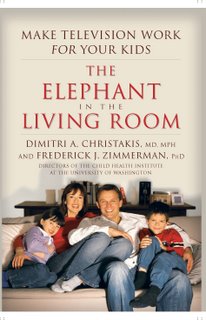Monday, September 25, 2006
Baby Mozart
The anxiety and guilt that many parents have around television finds a strange parallel in music. Most folks know what they like, but want their children to know better. And the makers of Baby DVDs know better yet: for they know that only the lowest common denominator of high brow endures. And so it is that we have Baby Mozart, Baby Beethoven, and Baby Brahms. True, no caring parent would dare stake their child's academic future on Aha or Enya or the Dead Kennedys. But dead Germans--now you're talkin'! These fail-safe luminaries will personally ensure that your baby understands first inversions in the phrygian mode before you do.
And yet, none of it really works. Research has thoroughly debunked the Mozart Effect, which was discovered to much bally-hoo when someone found that children who had been exposed to classical music early in their lives outperformed children who had been kept in dark caves. When appropriate adjustments were made for the other aspects of the child's environment, the Mozart Effect vanished like Figaro's bachelor days. Infants enjoy music, and it can promote healthy parent-child interactions, but listening to the Jupiter symphony again and again will not make your child a mathematical genius.
In that sense, the repertoire is a little limited. While I can appreciate the marketing challenges posed by a Baby Cage or a Baby Cobain , I'd be first in line to buy Baby BeBop . And if parents can ever shed their own insecurities and decide to have some fun, Baby Jewell will be a runaway hit.
And yet, none of it really works. Research has thoroughly debunked the Mozart Effect, which was discovered to much bally-hoo when someone found that children who had been exposed to classical music early in their lives outperformed children who had been kept in dark caves. When appropriate adjustments were made for the other aspects of the child's environment, the Mozart Effect vanished like Figaro's bachelor days. Infants enjoy music, and it can promote healthy parent-child interactions, but listening to the Jupiter symphony again and again will not make your child a mathematical genius.
In that sense, the repertoire is a little limited. While I can appreciate the marketing challenges posed by a Baby Cage or a Baby Cobain , I'd be first in line to buy Baby BeBop . And if parents can ever shed their own insecurities and decide to have some fun, Baby Jewell will be a runaway hit.
The Book
Friday, September 22, 2006
Why a Blog for Television and Children?

So, you've read the book (what, you haven't? click here), and you're wondering what more there could possibly be to discuss about television's effects on children. But that's just it, isn't it? Let's have a discussion. As Michael Thompson says, "everyone has an opinion on that subject." So let's share.
This blog will give me the chance to be more frank and less academic about the good, the bad, and the ugly of television. Dimitri and I have always said, "TV can be better than we ever expected, or worse than we feared." So let's get into the nitty gritty of it. Here I'll talk about some of the funny things (ha-ha funny, oh, that's odd funny, and that's not so funny) that happen when you put put kids into a childhood with a big, fat television. Don't worry--I'm not a supernanny, just a parent with a lot of expertise, a little bit of experience, and a belly full of hard-earned humble pie when it comes to parenting.
Stay tuned for a great conversation about how we can all make TV work ... for its living ... for a change ... for once.
